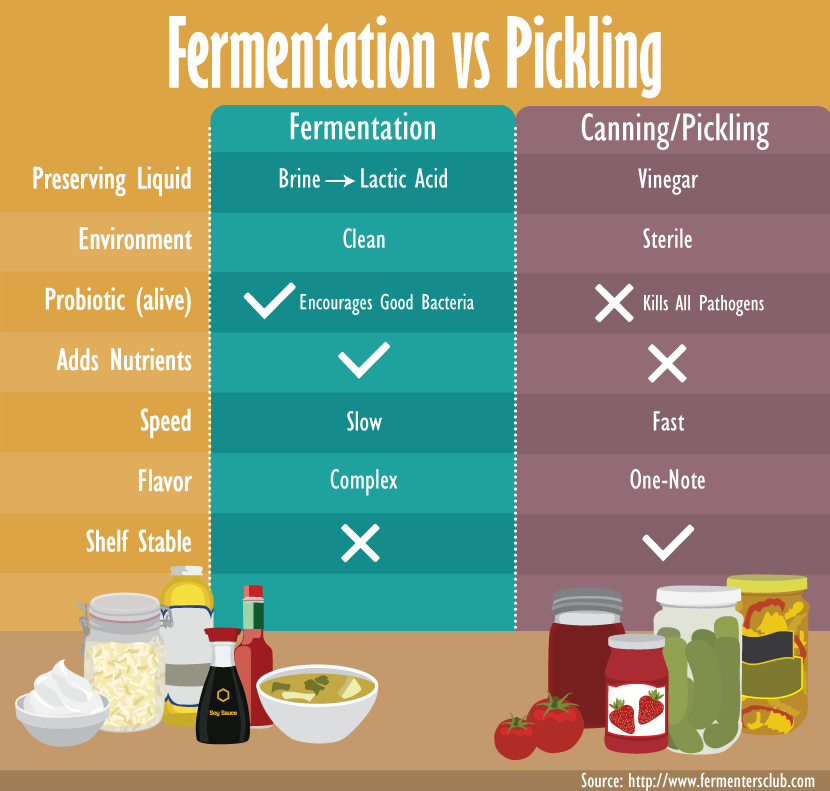Fermented foods have been around for centuries and are gaining popularity for their many health benefits. From improving digestion to boosting immunity, these foods are packed with probiotics that promote the growth of good bacteria in your gut. Not only do they have a tangy and flavorful taste, but fermented foods also help in nutrient absorption and can even contribute to weight loss. Incorporating fermented foods into your diet can have a positive impact on your overall well-being and leave you feeling healthier and more energized.
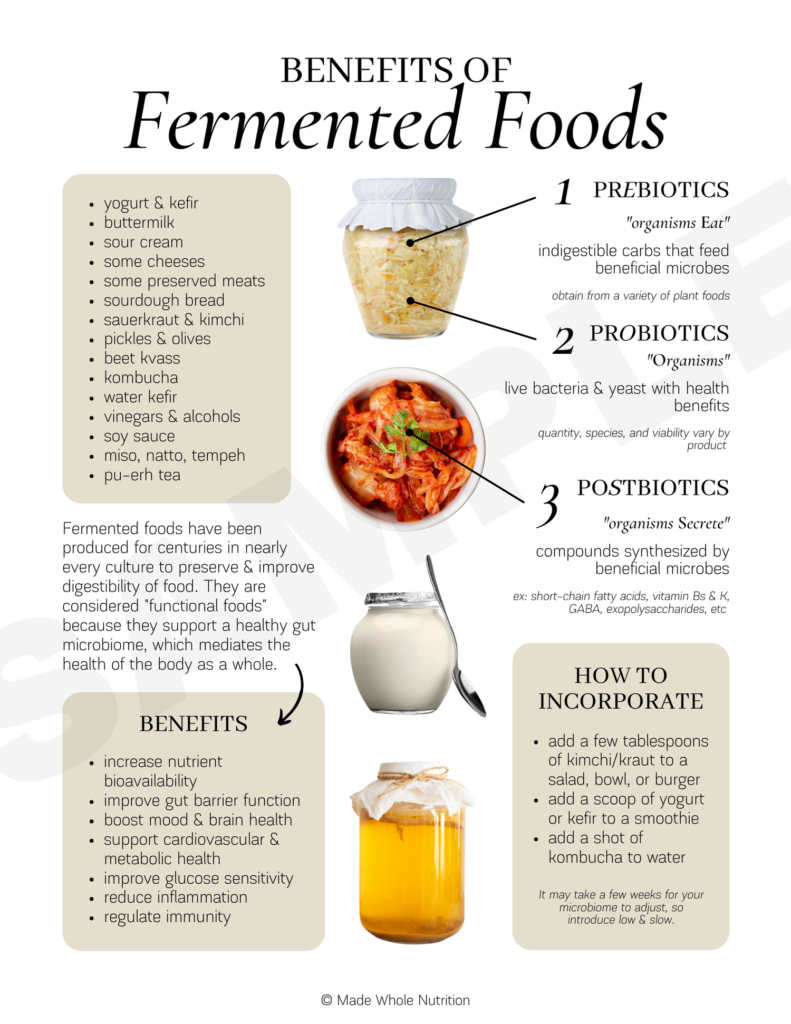
This image is property of images.squarespace-cdn.com.
Health Benefits
Enhances Digestion
Fermented foods are highly beneficial for enhancing digestion. During the fermentation process, the natural sugars in foods are broken down by bacteria and yeasts, resulting in the production of helpful enzymes and probiotics. These enzymes assist in breaking down the food, making it easier for your body to digest. This can alleviate common digestive issues such as bloating, gas, and indigestion. By improving your digestion, fermented foods ensure that your body can efficiently absorb and utilize the nutrients from the food you consume.
Boosts Immune System
A strong immune system is vital for warding off illnesses and maintaining optimal health. Fermented foods contain beneficial bacteria that help to strengthen the immune system. The probiotics found in fermented foods stimulate the production of antibodies and enhance the activity of natural killer cells, which are responsible for identifying and destroying harmful bacteria and viruses. By regularly consuming fermented foods, you can significantly boost your immune system and improve your body’s ability to fight off infections.
Improves Nutrient Absorption
Ensuring that your body can effectively absorb and utilize the nutrients from the food you eat is crucial for overall health. The fermentation process in fermented foods breaks down complex nutrients into simpler forms that are easier for your body to absorb. Additionally, the beneficial bacteria produced during fermentation create an optimal environment in your gut, enhancing nutrient absorption. By incorporating fermented foods into your diet, you can maximize the nutritional benefit you receive from the foods you eat.
Supports Weight Loss
If you’re on a weight loss journey, fermented foods can be a valuable addition to your diet. Fermented foods are low in calories and fat while being rich in beneficial nutrients. Additionally, the probiotics present in fermented foods can help regulate your appetite and increase feelings of fullness, reducing your overall calorie intake. The fermentation process also increases the bioavailability of certain nutrients, which can contribute to a healthier metabolism. By incorporating fermented foods into your diet, you can support your weight loss efforts in a tasty and nutritious way.
Reduces Inflammation
Chronic inflammation in the body can contribute to the development of various health conditions, including heart disease, diabetes, and arthritis. Fortunately, fermented foods have been found to have anti-inflammatory properties. The probiotics and beneficial compounds found in fermented foods help to reduce inflammation by balancing the gut microbiota and modulating the immune response. By regularly consuming fermented foods, you can help reduce inflammation in your body and potentially lower your risk of developing inflammatory diseases.
Gut Health
Introduces Beneficial Probiotics
One of the key reasons why fermented foods are highly regarded for gut health is because they introduce beneficial probiotics to your digestive system. Probiotics are live bacteria and yeasts that provide numerous health benefits when consumed. Fermented foods are a natural source of these probiotics, which can help restore the natural balance of bacteria in your gut. The introduction of beneficial probiotics through fermented foods can support overall digestive health and improve gut function.
Balances Gut Microbiota
The gut microbiota refers to the complex community of microorganisms that reside in our digestive system. Maintaining a healthy balance of these microorganisms is essential for optimal gut health. Fermented foods, with their abundance of probiotics, contribute to the restoration and maintenance of a balanced gut microbiota. The beneficial bacteria in fermented foods compete with harmful bacteria for nutrients and space, ultimately promoting the growth of beneficial bacteria in your gut. By regularly consuming fermented foods, you can help establish a diverse and balanced gut microbiota, which is crucial for digestive and overall health.
Promotes Healthy Gut Lining
The lining of your gut plays a vital role in nutrient absorption and acts as a barrier, preventing harmful substances from entering your bloodstream. A healthy gut lining is essential for overall digestive and immune health. Fermented foods support the health of your gut lining by promoting the production of short-chain fatty acids (SCFAs). SCFAs provide energy for the cells in your gut lining and help to strengthen the integrity of the intestinal barrier. By incorporating fermented foods into your diet, you can promote a healthy gut lining, which is essential for overall gut health and well-being.
Nutritional Value
Increases Bioavailability of Nutrients
The fermentation process enhances the bioavailability of nutrients in foods. This means that the nutrients in fermented foods are more easily absorbed and utilized by your body. For example, fermentation of grains can reduce the levels of phytic acid, which is known to inhibit the absorption of certain minerals such as iron and zinc. Fermentation breaks down the phytic acid, increasing the bioavailability of these minerals. By consuming fermented foods, you can ensure that your body is receiving a higher level of nutrients from the foods you eat.
Enhances Vitamin Content
Fermented foods are not only rich in beneficial bacteria but also in vitamins. During the fermentation process, certain vitamins, such as vitamin C and B vitamins, can actually increase in content. For example, sauerkraut, a popular fermented cabbage dish, is an excellent source of vitamin C. The increase in vitamin content in fermented foods is a result of the activity of beneficial bacteria and yeasts during the fermentation process. By including fermented foods in your diet, you can enjoy the added nutritional benefit of increased vitamin content.
Enriches Mineral Absorption
In addition to enhancing the bioavailability of nutrients, fermented foods can also improve the absorption of minerals in your body. The beneficial bacteria present in fermented foods produce enzymes that break down complex minerals into simpler, more absorbable forms. This enhances the absorption of minerals such as calcium, magnesium, and iron. By incorporating fermented foods into your diet, you can ensure that your body is efficiently absorbing the essential minerals it needs for proper functioning.
Improved Mental Health
Promotes Brain Health
There is increasing evidence that the health of your gut is closely linked to the health of your brain. The gut-brain connection emphasizes the importance of a healthy gut for optimal mental well-being. Fermented foods, with their beneficial probiotics, can positively impact your mental health. The probiotics in fermented foods help regulate the production of neurotransmitters such as serotonin, which plays a significant role in mood regulation. By promoting a healthy gut microbiota, fermented foods can contribute to improved brain health and overall mental well-being.
Helps Reduce Anxiety and Depression
Anxiety and depression are common mental health disorders that can significantly impact a person’s quality of life. Research suggests that there is a connection between gut health and these mental health conditions. Fermented foods, with their probiotics, can help alleviate symptoms of anxiety and depression. The probiotics in fermented foods reduce inflammation in the gut and improve the production of neurotransmitters, which are essential for mood regulation. By incorporating fermented foods into your diet, you can potentially experience a positive impact on your mental health and well-being.

This image is property of www.goodfoodmadesimple.com.
Cancer Prevention
Antioxidant Properties
Fermented foods are known to possess antioxidant properties, making them a valuable addition to a cancer-preventing diet. Antioxidants help protect your cells from damage caused by free radicals, which can lead to chronic diseases such as cancer. The fermentation process enhances the antioxidant content in foods, thereby increasing their ability to neutralize harmful free radicals. By consuming fermented foods regularly, you can harness the antioxidant power they offer and potentially reduce your risk of developing certain types of cancer.
Reduces Cancer Risk Factors
In addition to their antioxidant properties, fermented foods have been found to reduce certain risk factors associated with cancer development. For example, the consumption of fermented soy products has been linked to a reduced risk of breast, prostate, and colorectal cancers. Fermented foods that contain beneficial bacteria can also help modulate the immune response and enhance the body’s ability to eliminate abnormal cells. By incorporating fermented foods into your diet, you can potentially reduce your risk of developing cancer and promote overall health.
Cardiovascular Health
Lowers Cholesterol Levels
High levels of cholesterol can contribute to the development of heart disease. Fermented foods can play a role in maintaining cardiovascular health by helping to lower cholesterol levels. Some fermented foods, such as kimchi and miso, contain compounds that have been found to reduce total cholesterol and LDL (bad) cholesterol levels. The beneficial bacteria in fermented foods can also enhance the metabolism of fats, which is beneficial for maintaining healthy cholesterol levels. By including fermented foods in your diet, you can promote a healthy cardiovascular system and reduce the risk of heart disease.
Regulates Blood Pressure
High blood pressure is a significant risk factor for heart disease, stroke, and other cardiovascular conditions. Fermented foods can contribute to the regulation of blood pressure levels. Some fermented foods, like kefir and yogurt, contain bioactive peptides that have been shown to help reduce blood pressure. The probiotics found in fermented foods also have anti-inflammatory effects, which can further support cardiovascular health. By incorporating fermented foods into your diet, you can help regulate your blood pressure and protect your heart.
Supports Heart Health
Maintaining a healthy heart is essential for overall well-being. Fermented foods offer numerous benefits that support heart health. The probiotics present in fermented foods have been found to reduce the levels of triglycerides, a type of fat that can contribute to heart disease. By consuming fermented foods, you can help maintain healthy cholesterol levels, regulate blood pressure, and reduce inflammation, all of which contribute to a healthy cardiovascular system. Incorporating fermented foods into your diet is a delicious and proactive way to support your heart health.
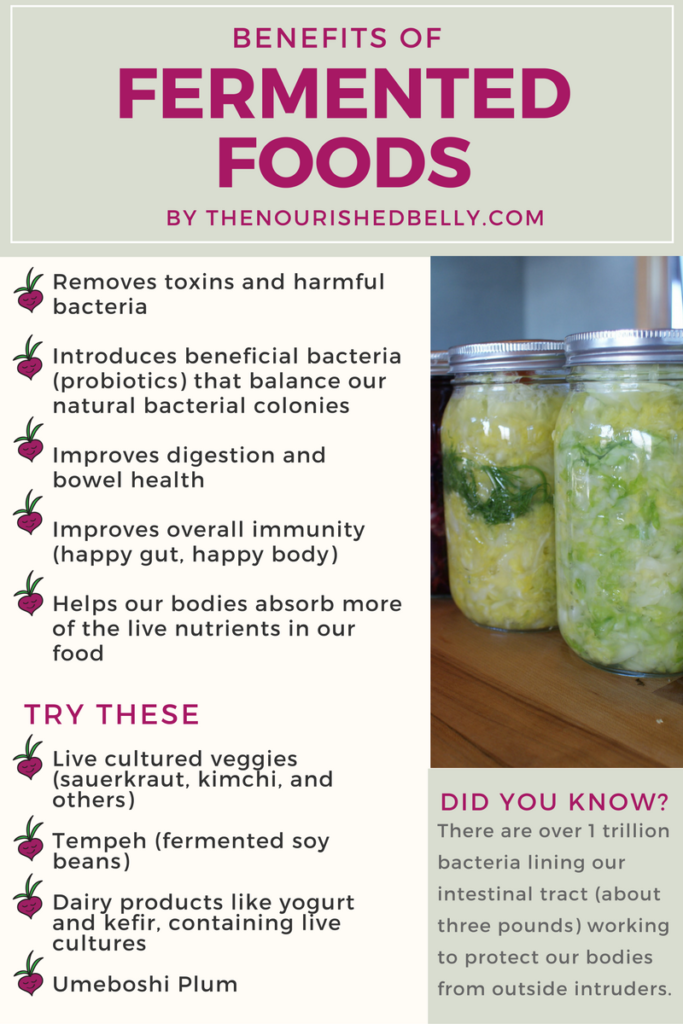
This image is property of images.squarespace-cdn.com.
Weight Management
Increases Satiety
If you struggle with managing your weight, incorporating fermented foods into your diet can be beneficial. Fermented foods have been found to increase feelings of satiety, helping you feel fuller for longer. The probiotics in fermented foods regulate the production of hormones that control appetite, promoting a sense of fullness. By consuming fermented foods, you can help curb cravings and reduce the desire to snack between meals, leading to better portion control and weight management.
Aids in Weight Loss
In addition to increasing feelings of fullness, fermented foods can aid in weight loss. As mentioned earlier, the beneficial bacteria present in fermented foods can enhance your metabolism. A healthy and efficient metabolism plays a crucial role in weight management. By incorporating fermented foods into your diet, you can support your weight loss goals by improving your metabolism and ensuring that your body efficiently processes and utilizes the nutrients from the foods you consume.
Fermented Foods for Vegans and Vegetarians
Alternative Source of Protein
For individuals following vegan or vegetarian diets, fermented foods can be an excellent source of protein. Fermented soy products, such as tempeh and miso, are highly nutritious and rich in protein. These fermented alternatives provide plant-based protein that is easily absorbed by the body. By including fermented foods in your diet, you can ensure that you are meeting your protein needs, even without consuming animal products.
Increased Iron Absorption
Iron is a crucial nutrient, especially for vegans and vegetarians who may have limited sources of this mineral in their diets. Fermented foods can actually help increase iron absorption in the body. Plant-based sources of iron are often less readily absorbed than those from animal products. Fermentation enhances the bioavailability of iron, making it easier for your body to absorb and utilize. By incorporating fermented foods into your diet, you can maximize your iron intake and support optimal health.
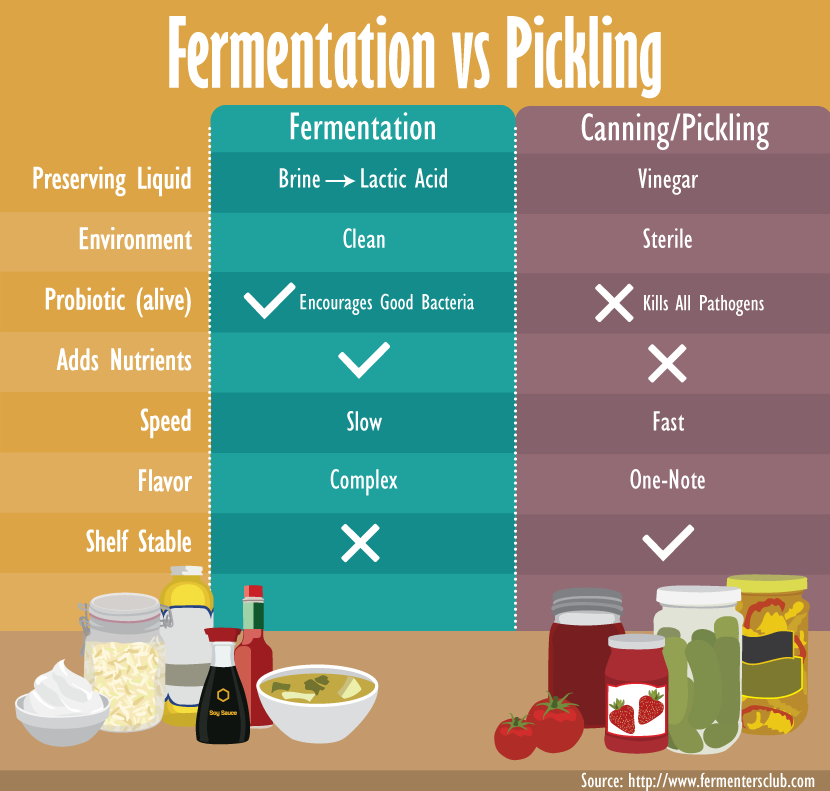
This image is property of fixcom.azureedge.net.
Digestive Disorders
Alleviates Symptoms of Irritable Bowel Syndrome
Irritable bowel syndrome (IBS) is a common digestive disorder that can cause significant discomfort and impact your quality of life. Fermented foods have been found to alleviate the symptoms of IBS. The probiotics in fermented foods can help regulate gut motility and reduce inflammation, providing relief from symptoms such as abdominal pain, bloating, and irregular bowel movements. By incorporating fermented foods into your diet, you can potentially improve your digestive health and manage the symptoms of IBS.
Reduces Occurrence of Diarrhea
Diarrhea can be a distressing symptom of various digestive disorders or simply a result of an imbalance in gut bacteria. Fermented foods can help alleviate and reduce the occurrence of diarrhea. The beneficial bacteria in fermented foods promote a healthy gut microbiota, which in turn can help regulate bowel movements and improve digestion. By regularly consuming fermented foods, you can support your digestive system and reduce the occurrence of diarrhea.
Conclusion
Incorporating fermented foods into your diet can provide numerous health benefits. From enhancing digestion and boosting the immune system to improving mental health and supporting weight loss, fermented foods offer a range of advantages for overall well-being. With their ability to introduce beneficial probiotics, balance gut microbiota, and promote a healthy gut lining, fermented foods play a crucial role in ensuring optimal gut health. Furthermore, fermented foods increase the bioavailability of nutrients, enhance vitamin content, and enrich mineral absorption, making them a nutritional powerhouse. Additionally, fermented foods have been found to contribute to improved mental health, reduced cancer risk factors, and enhanced cardiovascular health. Whether you’re following a vegan or vegetarian lifestyle or dealing with digestive disorders, fermented foods can offer specific benefits tailored to your needs. With their abundance of health-promoting properties, fermented foods are truly a valuable addition to any diet. So why not incorporate delicious fermented foods like sauerkraut, kimchi, kombucha, or yogurt into your daily meals and reap the numerous advantages they provide for your overall health and well-being? Your body will thank you.
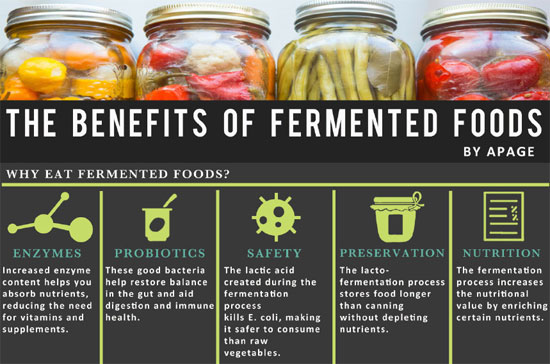
This image is property of irishhealthstores.com.

